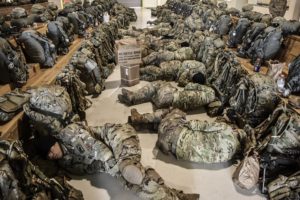In this short article published by Health.mil, the official website of the US Military Health System, the benefits of good sleep for recovery from injuries is discussed. Although some of the references are aimed at US personnel, the overall advice is relevant to anyone who has suffered injury - and particularly TBI. Based upon the personal experience of having suffered bad concussion as a result of a military accident, we know that it can take many years and plenty of sleep to fully recover. Please do get back to us with any comments whether you have suffered TBI or are a medical type helping to treat patients. Ed.

Sleep is an important factor in health. In addition to aiding in the healing of the body after injury, studies suggest that sleep can help boost the immune system, prevent disease, and ease depression. Yet a common complaint among service members and veterans with traumatic brain injury is difficulty sleeping. Many people with brain injuries also experience sleep disorders.
Sleep disorders and sleep disturbances are two different things.
A concussion and a sleep disorder can present with similar symptoms such as irritability, headaches, anxiety, and inability to focus. Treatment of TBI starts with the treatment of sleep to help determine which symptoms are related to poor sleep and which are injury related.
“For instance, something like short-term memory is very impacted by sleep loss,” said Dr. Janna Mantua principal investigator studying sleep at Walter Reed Army Institute of Research. “Ruling out sleep disorders that might be undetected is really critical.”
For those with a TBI, sleep disturbances or poor sleep can actually slow recovery and worsen symptoms, according to Defense and Veterans Brain Injury Center (DVBIC) officials. Those who are not getting adequate sleep report more pain, irritability, memory loss and functional problems.
Mantua said historically people with brain injuries were kept awake to monitor symptoms, but that is no longer the guidance. “The general recommendation is the opposite: to rest, to stay in the dark, to not look at any screens,” she said.
Sleep can be sabotaged by choosing to sleep at the wrong time, getting too much screen time before bed, or self-medicating. “A Better Night Sleep” podcast, produced by the Defense Health Agency, gives practical tips on sleep disorders and information on the evidence-based treatments that really work.
“The number one nonprescription drug people are taking to help them get to sleep at night is a beer or a glass of wine, or other kinds of alcohol,” said Dr. Julie Kinn, research psychologist at DHA. “But then, you’re putting a lot of sugar into your body, you’re going to metabolize it in a few hours and need to get up and go to the bathroom, and then you’re going to be wide awake. Plus drinking alcohol doesn’t help you learn other good ways of getting to sleep like meditating, purposefully relaxing or turning of all your screens, etc.”
Patients and healthcare providers have access to resources for learning healthy sleep habits. The Defense and Veterans Brain Injury Center recently released a Sleep Interactive Provider Training to teach military providers the evaluation and management of sleep disturbances following concussion in a deployed and non-deployed primary-care setting. The interactive training introduces the “Management of Sleep Disturbances Following Concussion/Mild TBI Clinical Recommendation” and companion clinical support tool. DVBIC also provides guidance to help primary care managers assess and manage sleep disturbances associated with concussion, including specific recommendations for managing symptoms of insomnia, circadian rhythm sleep-wake disorder, and obstructive sleep apnea. The healthy sleep fact sheet offers tips and exercises for patients to help get a better night sleep.
Mantua encourages anyone with sleeping difficulties to speak to your doctor. “We know how to treat bad sleep. Sometimes it takes people a long time to get there – for instance insomnia is difficult to treat – but we know treatments that work.”
Words and image from US Military Health System Communications Office

Comments on Healthy sleep for healing
There is 1 comment on Healthy sleep for healing
Comment by Kelen
Great and helpful article to those who are having sleeping disorders.
Handpicked links